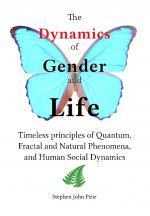[Excerpt Be and Become, © ProCreative, Sydney 2000] -- Previously, from "Mastering the Mystery"; Chapter Nine: "Men are Particles, Women are Waves" © Stephen Pirie 1996-2000. Library of Congres TXu 1-573-730]
Key Concepts:
- Men (and males in general) lean towards the embodiment of the physical (objective, material) nature of 'separateness'—competitiveness, building and control (of) structure, order, status and hierarchy.
-
Women (and females in general) lean towards the embodiment of the spiritual (subjective-wave) nature of 'togetherness'—cooperativeness, relationships and the development of non-hierarchical communities (herds).
This leaning towards individual-particle or collective-wave behaviour provides the framework for understanding the differences and similarities of gender, irrespective of culture, time or circumstance. It provides the framework to understand why:
- women tend to live longer
- men tend more to engage risk, and the extremes in behaviour (murderers and musicians; adventurers and autistics)
- women are better at interpersonal/communications skills
- the origin of the dichotomy of perfect Madonna (and religious virgin birth) or damned whore
- (Western) men are around nine times more likely to commit suicide after a relationship breakup
- (Western) women were traditionally (and still are) perceived and expected to be more refined ("they don't fart"), gentler and less competitive than men.
- women have been seen to be more intuitive and spontaneous (hence 'feminine mystique' and 'women's intuition')
-
the preponderance of males involved in wars, paedophilia, atheism and the sciences.
in more detail ...
- Women have traditionally lived longer due to the deeper embodiment of a supportive collective-wave nature, emotional expression, and intuitive awareness.
- Men, in being more objectively orientated (i.e. preoccupied with things) are less able to deal with life’s emotional and relationship demands. Western men are aournd nine times more likely than women to commit suicide as a result of a relationship break up.
- Due to the belief in 'separateness' (and spiritual perfection) women have been traditionally) perceived in Western societies as being more virtuous and innocent than men, and held in higher esteem (are “placed on pedestals”).
- When women step down or fall from their exalted position of virtue and goodness, they are perceived to have plunged into the depths of depravity. Hence the dichotomy of the perfect virginal Madonna or damned whore, the double-standard in sex, and other observed differences.
- Due to the bias towards 'separateness', physical survival becomes primary - hence the protection of "women and children," in wars and natural disasters.
- Men, in being objectively orientated—biased towards seeing the world in terms of “things”— remain stuck to some extent in adolescence (the phase of development which focuses on independence, objectivity and differences). Hence 'boys and their toys'.
- The bias towards 'separateness' results in males engaging the extremes of behaviour - the greatest scientists, artists and the worst murderers and despots.
- Due to our cultural immaturity and the prevailing (Western) belief in, and behaviours based on, 'separateness', we have (traditionally) seen women and children as victims, pure and innocent and men as violent, aggressive and responsible.
- The dichotomy of the sexes is due to the habit of overly separating the physical (the masculine) from the spiritual (the feminine).
- Western societies (in becoming more 'masculine' - greater reliance on objectivity, technology, science, computers) will invite and cause increasing rates of autism and related 'extreme masculine' behaviours.
- The masculine bias towards 'things' enables the overt objectification of reality, and everyone within it (incl. women, children and other males) - hence the preponderance of males involved in wars, paedophilia, atheism, sciences.
 "The Dynamics of Gender and Life" ebook is now available at
"The Dynamics of Gender and Life" ebook is now available at